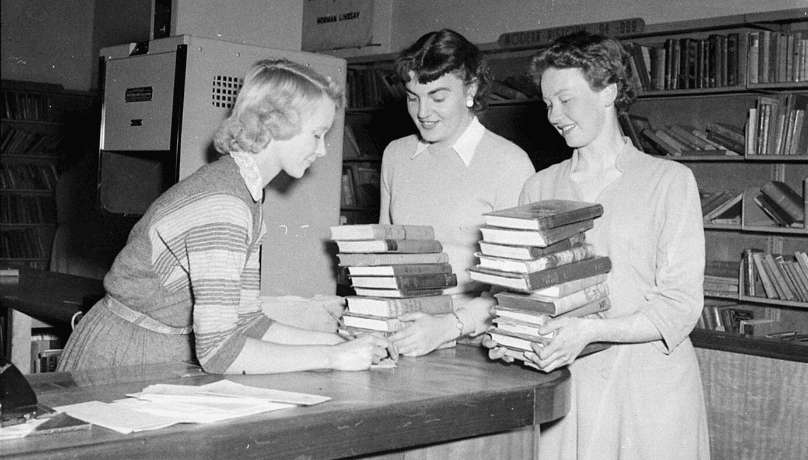How to Put on a Literature Festival
The UK is famous for its literary festivals. We are lucky to have dedicated people and organisations with the passion and power to bring authors and readers together through a shared love of the written and spoken word.
If you’ve ever attended a literature festival and been inspired to run your own event, then this guide will help take you from pipe dream to reality.
With established annual literature festivals such as Edinburgh International Book Festival, Hay Festival and Cheltenham Literature Festival, the big question is how are you going to make your book festival stand out in the crowd?
Planning a literature festival
Planning a book festival can take weeks, months and even years in some cases. If this is your first year, the longer you have to plan the better! Don’t let short deadlines hamper the success and creativity of your event.
Who is your book festival for?
Although there are a number of successful literature festivals aimed at a specific genre or form of literature, such as poetry festivals, aiming to cater for everyone at your book event is a great selling point.
When in the initial planning stage, ensure that your event includes sessions for young children, teenagers and adults. We’ll cover supporting event ideas later in the guide.
Choosing your venue
When it comes to choosing a venue for your event, there are several considerations to take into account.
Location
When thinking about location, the main consideration is ensuring that your attendees can get there easily. Consider transport links, parking, traffic and accessibility for all. You may also want to consider holding some of your events in informal surroundings like a pub, café or unusual space. In Bristol, for example, they host readings in the ancient Redcliffe Caves that stretch beneath the city.
Types of venue
When it comes to the type of venue be as creative as possible. By putting on events in unexpected places, it helps spark interest and make for a memorable evening. Other than theatres and auditoriums consider venues such as:
– A back room of a pub
– Cafes
– Bookshops
– Drama studios
– Town halls
– Gardens or parks
– Bandstands
If you’re running several events alongside each other, consider splitting your literature festival over a variety of central venues during the event.
Venue layout
If your vision includes different streams of timetabled events, choosing a venue with multiple rooms or spaces is imperative. Large auditoriums are ideal for larger, popular events whereas smaller meeting rooms or drama studios are perfect for workshops and more intimate sessions.
Consider being playful with the layout and try moving your ‘stage’ to the center of the room to make your audience part of the action.
Remember that areas can be divided using furniture, plants or seating, but be mindful about sound levels.
Ambience
Many event venues offer a blank canvas space that allows you to realise your vision and create an atmosphere perfectly suited to your event. However, you should consider thinking outside the box and research more unusual venues – the grounds of a stately home, an industrial warehouse or theatre could transform your literary event.
As well as providing a platform for your speakers, your venue also needs to encourage collaboration. Many book lovers attend literature festivals in order to meet and converse with like-minded people. Your venue should include break-out spaces that encourage open and collaborative conversations. As well as making the space for this, you should also factor breaks into your timetable.
Time of year
Your choice of venue will also be determined by the time of year you plan on holding your event. If you’re keen to host an outdoor book festival, then the spring and summer months from April to August will be the better option. However, they will also be the most popular and most expensive. You also want to ensure that your festival doesn’t clash with other similar events.
Duration of your festival
If you’re putting on your first literary event, it is highly unlikely that your event will be scheduled to run for a full week. Depending on your budget and variety of speakers, it’s more likely that you’ll begin with a one or two-day weekend event in your first year. The phrase ‘don’t run before you can walk’ shouldn’t be taken lightly.
Selecting a planning committee
However passionate and determined you are, planning a book festival isn’t a one-person job. Put together a small dedicated planning team who can work with you to achieve your goals. Look to your local community and approach people such as librarians, teachers, bookshop owners and workers. It’s more than likely that they will have attended literature festivals in the past and have their own ideas on how to make the event a success. Connecting with people that are passionate and harnessing this energy in the planning stages is a great way to shape your event.
It’s also worth considering collecting a group of people, including children, teenagers and adults, who can act as a sounding board for your ideas. You never know what creative ideas they could come up with along the way!
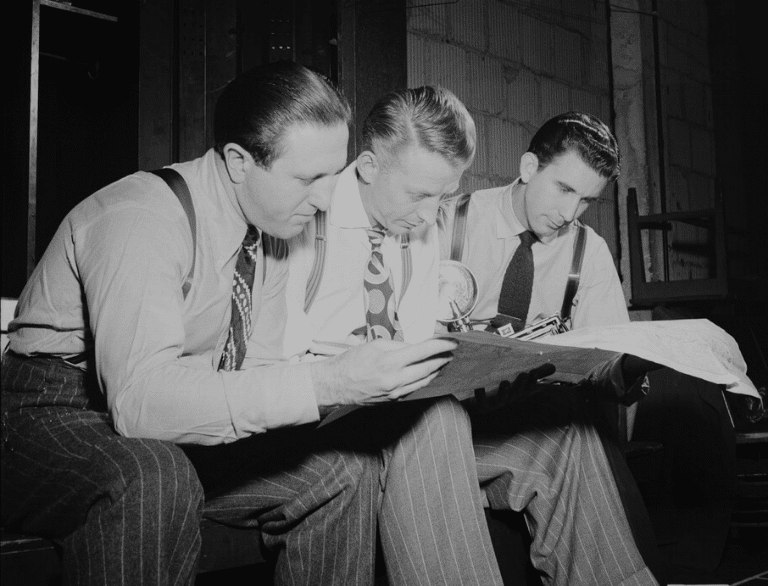
Portrait of Stan Kenton from The Library of Congress via Flickr
Funding your book festival
Especially in your first year, it’s very unlikely that you will receive significant funding for your literature festival. Therefore, you will be relying on sponsorship, partnerships and ticket sales to run your event.
Partnerships
A strategic partnership can go a long way when launching a new event and not just in monetary terms. A well-thought partnership can help you reach a whole new audience, gain access to complementary resources and in general form long-lasting and mutually beneficial relationships.
Start by looking at your local community. Are there any complementary businesses or organisations that would fit well with your literature event? Any that share a similar audience? Some ideas are your local…
– Coffee shop or café
– Newspaper, magazine, zines
– Youth club
– Bookshop
– Library
– Theatre
– Film society
Cerith Mathias organiser of Cardiff Book Festival acknowledges the importance of partnerships: “We’ve had a huge amount of support and encouragement for the festival; writers, publishers and the public have really embraced it. We can’t have asked for more from organisations like Literature Wales, Cardiff Council and Cardiff University. They’ve given us their time, expertise and facilities.”
Ticketing & how to pitch prices
There are a various ticketing options available when running an event of this style; weekend tickets, day tickets and single event tickets.
In order to make a decision on pricing, take a look at the variety and scale of sessions on offer to a visitor. If you’ve managed to confirm a well-known author, you may want to allocate separate tickets for this event to cater for demand.
Alternatively, if you’d rather keep ticketing simple, we’d suggest selling one-day or weekend tickets depending on the duration of your event.
If you are pitching your event as a family-friendly affair, ensure this is reflected in the pricing and offer different brackets of tickets. For example, for a weekend festival:
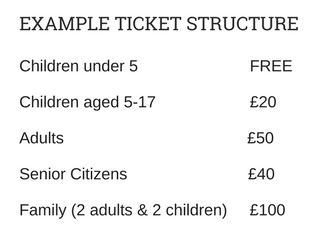
*example pricing
If you have timetabled smaller sessions to run at the same time as popular authors, talks or workshops, consider offering these as free sessions. This will help drum up interest and be a great platform to promote your other paid events.
This is also beneficial for those who stumble across your event, especially if it is being held in a central or popular location.
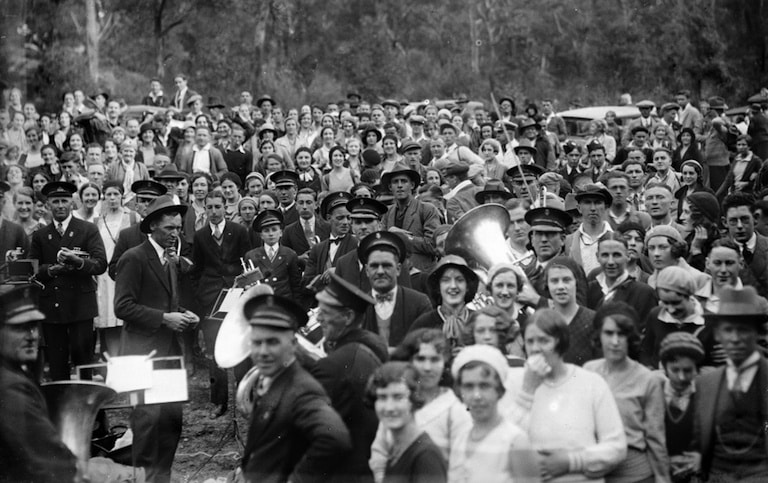
Palmers Mystery Hike from Powerhouse Museum Collection via Flickr
Literary event ideas & themes
Book festival themes
When people think of what they’d see at a literature festival, it’s likely that they imagine an author sat on a stool, on a stage, reading from their latest book. And although that does happen, the key to making your event stand out is to offer something a little different.
When coming up with ideas for your literature festival be as creative as you can. You want to inspire your attendees with high-quality, relevant and interactive sessions.
If your planning committee doesn’t include a research group or sounding board, use social media to consult with your potential audience about what and who they would want to see at your event. Ask people what literary sessions they have liked in the past and encourage children to input their ideas too.
Choosing presenters
When it comes to choosing speakers for your sessions, the key is to cater for a diverse range. This helps ensure that there’s something for everyone and is also a great selling point for your festival.
As well as the popular literature session presenters such as authors and poets, consider thinking outside the box and include:
– Illustrators
– Journalists
– Rap artists
– Slam Poets
– Motivational speakers
– Philosophers
– Puppeteers
– Songwriters
– Politicians
– Podcasters
– Voice actors
As well as hosting readings from a variety of authors, journalists and other presenters, you’ll also want to support your festival with workshops and supporting events.
The possibilities are endless so start by breaking your audience down and think of what would be most exciting and relevant for them.
Diversity and inclusion
By choosing speakers and authors from different backgrounds whether this is around culture, religion, sexual orientation, gender and race you can create a more engaging and enriching experience for your attendees. Ask your speakers to recommend diverse talent and ask your planning committee who they’d like to see at the literature event.
Literature events for children
Ideas for inspiring book-related activities for children:
Interactive nursery rhymes – Action songs are a great way for young children to improve their language and vocabulary. Your presenter will be at the heart of this session and lead with rhymes and actions for the children and adults to get involved in.
Storyteller – Storytelling is as simple as reading a story from a book. However go one step further and create a storyteller persona by getting your presenter to dress up and take on a whole new persona.
Puppetry – Puppet shows stimulate imagination and help improve a child’s creativity. With so much time spent in front of the television, puppet shows are a traditional way for skilled practitioners to use characters to bring a story alive. They can be used across a broad range of topics and themes.
Becca Lewis, project co-producer on Small Victories, a puppet show that retells stories of everyday women doing exceptional things in engineering, states: “Puppetry and storytelling allowed us to get the whole audience to join in with the physicality and emotional worlds of the characters. For example, they helped create the chaotic sound of a factory in contrast to the silence of the protagonist.”
Meet your favourite characters – Hire trained actors to act out famous characters from children’s books. Allowing the children to interact and ask questions will bring their favourite stories to life.
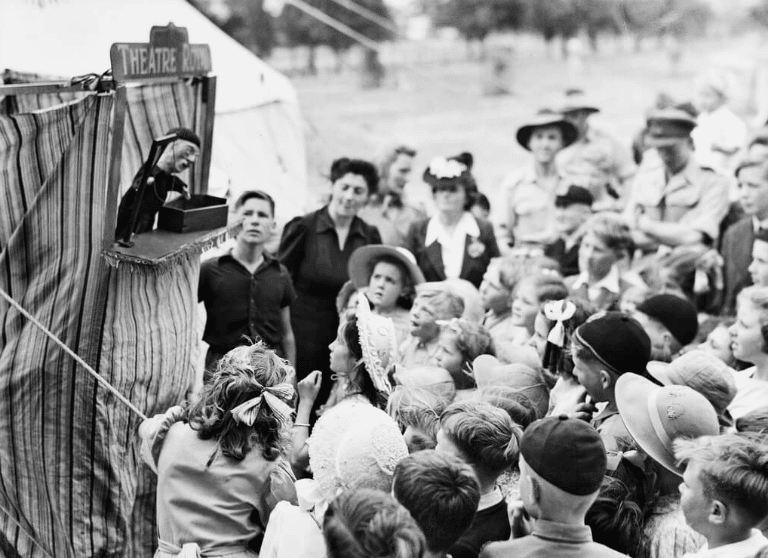
Punch and Judy show from the Australian War Memorial’s collection via Flickr
Literature events for teenagers
Live illustration alongside readings – Bring a highly creative and interactive twist to author readings by having an artist illustrate whilst the book is being read. From traditional illustrators through to calligraphy and graffiti artists, there are numerous options.
Creative writing workshops – Host a creative writing workshop, catering for absolute beginners through to intermediate writers. This is all about inspiring confidence in the next generation of writers.
Supportive workshops – Think of workshop ideas that are both relevant but also give teen attendees the chance to experience a literary job such as how to make your own magazine, write a news article, edit a script etc.
Poetry slam – Poetry slams hail from America and aim to move poetry recitals from academia over to a wider audience. Publicise this event before the festival and invite attendees to write their own poem to recite at the slam.
Poetry slams can also take the form of improvised rap battles, which have taken the teenage world by storm. Simon Armitage, professor of poetry at Oxford University, uses rap and hip-hop to explore the definition of modern poetry ‘so the literary form is not thought of “as a museum”.’
Rap / hip-hop performer – Invite a rap or hip-hop artist to perform at the festival and then follow this with a question and answer session about how they write their lyrics.
Greg Gatenby, founder of the International Festival of Authors, explains the importance of relevancy: “If you want to convince young people to come to readings, you need to have someone there that is part of the younger generation’s comfort zone and do it in a place that’s comfortable for the young audience. Finding a hip author and a hip speaker really does make a difference. In such a setting, young people are willing to explore new genres and authors.”
More supporting literary event ideas
The following are some ways that you can shake-up and enhance the traditional format of the literary event:
Sign language – Ensure your literature festival is accessible by offering some signed events for both adults and children. Hearing-impaired attendees will need a clear view of the interpreter so make sure that it is easy for them to contact you to request suitable seating arrangements for those events.
Open panel discussion – Host an open panel discussion amongst a varied range of speakers and encourage healthy debate between different artists of spoken and written word.
Walking book group – This idea is particularly good if you have a local author speaking at your festival. Arrange to meet attendees in a location before setting off to discover the places that inspire the author and their work. Similarly, if you are lucky enough to be hosting in a city or town with a literary background, you can run guided walking tours around the streets.
Interviews – It’s not uncommon for authors to be interviewed at literature festivals. Go one step further and get journalists, hip hop artists and bookshop owners to carry out the interviews.
Live performances – If you have musicians speaking at your event invite them to also perform later in the day. Audiences who have seen their earlier talk will get the opportunity to hear their words in action.
Incorporate a book launch – Bring even more of a buzz to your literature festival by combining two events in one and incorporate a book launch. This could run as a two-hour event within your timetable and include sessions such as:
– Introduction from the author about their latest book and their writing process
– Interview with the author
– Short reading from the new book
– Question and answer session with the audience
– Book signing
For more ideas check out our guide to Book Launch Events.
Short story competitions – Run a short story competition in the run up to the event. You can then invite your shortlist to read their short story at the festival before running live judging and announcing the winner. Prizes could be anything from free books to an introduction to a well-known author at the event.
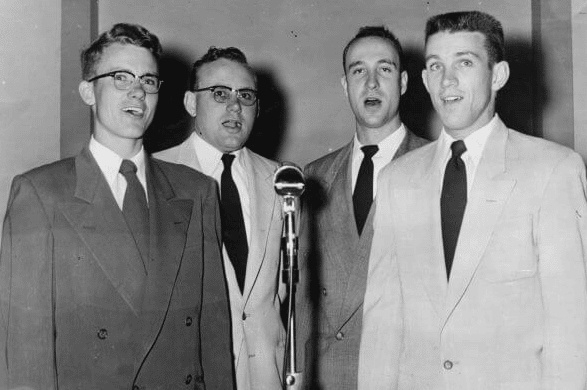
Mennonite Church USA Archives via Flickr
How to innovate around literature festivals
With many literature festivals still following a traditional format this is where you can really set your literary event apart from the crowd. Combine traditional ideas with modern techniques to throw your event into the spotlight.
Immersive theatre
Immersive theatre breaks down the barriers between the performer and the audience, enabling the audience to become part of the story. This could be a performance based on a popular novel that allows the audience to walk around and interact with the characters. This allows the audience to be as involved or passive as they want. London is home to many fantastic and world-leading immersive theatre companies.
If you’re a director or part of a theatre group, read our theatre funding guide to find out more about your funding options available in the UK.
Live translations
With non-English books becoming more popular in the UK, inviting an author from overseas would be a great selling point for your event. The author would read the book in its original language while a live translation appears on a screen.
Submit questions via Twitter
During the question and answer sessions encourage attendees to submit their questions via Twitter using a specific event hashtag. You can also encourage them to tweet throughout the day, including their feedback on the sessions they’ve attended. This will give you extremely valuable user-generated content (UGC) for your next promotion!
Timetabling tips for your literature festival
– It’s likely that you will be running a number or talks, sessions and workshops side by side, therefore it is important to schedule your events into streams to allow your audience to attend as many as possible. For example, don’t schedule two poetry sessions at the same time as it is likely that the same attendees will want to go to both.
– Allow enough time between sessions for people to get to their next venue and get comfortable.
– Keep sessions succinct to ensure that attendees stay focused and are able to visit a number of talks and workshops throughout the day. For most events, 45-minute sessions is optimum. There is potential to run longer events but remember to build-in breaks.
– Make the program available online & offline
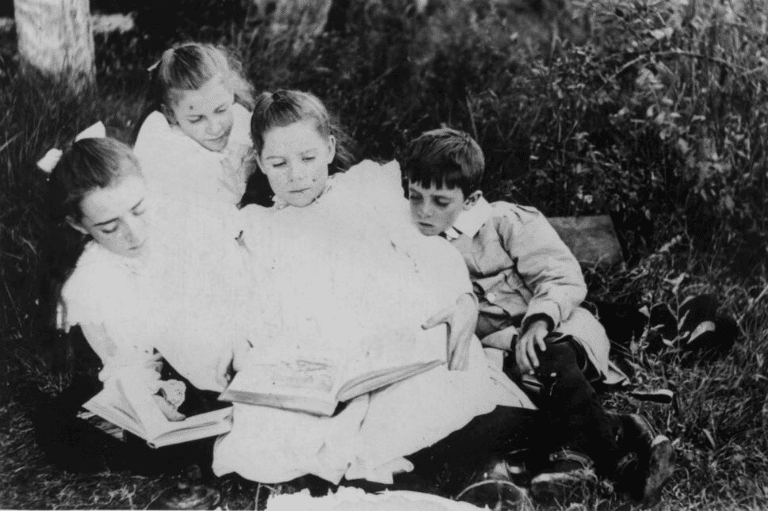
Group of children reading books from the State Library of Queensland via Flickr
How to promote a literature festival
When it comes to promoting your literature festival, the first question you should ask yourself is ‘what’s the hook?’ Is your event in an unusual venue? Have you booked a well-known presenter/author? Are you running an innovative session during the day? Once you have your hook, you can start creating engaging content and images, and promoting them to your target audience. Examples: images with overlaid text.
Branding a literature festival
Your brand visuals should be eye-catching and include important information such as your event name and logo, event dates and website address. If you don’t have the budget to hire a graphic designer, consider contacting a local college or sixth form and give a student the opportunity to design the assets in exchange for free tickets to the event.
Want to know more about getting your event online, whether that’s a dedicated website, page on your existing site or event platform? If so, head over to our event websites and listings guide here.
Online ways to promote your literature festival
Social media – Use paid and organic social media to promote your event. Create an event hashtag and ensure it’s included in all your marketing collateral. For more information, check out our guide on how to use Facebook to promote your event.
Influencers – Encourage your speakers and presenters to share the event on their social channels, website and in email newsletters.
Online PR – Contact local press with information about the event. If you write a press release ensure that it’s short, concise and full of great hooks and information for the readers.
Offline ways to promote a literary festival
Local press and radio – Local newspapers and radio stations are always looking for valuable content. Get in contact and discuss your event and what makes it unique.
Schools – Work with your local schools to get students to design posters and display them around the school as well as sending leaflets home for parents.
Nurseries – If your event is running sessions for pre-school children, contact your local nursery to let them know about the event. Encourage them to put up posters and send letters home with children for their parents.
Library – Organise a promotional reading at your local library to increase awareness of the literature festival.
Book clubs – Get in touch with local book groups and personally invite them to the event.
Open mic nights – Get down to your local open mic night. It’s a great place to promote your event as well as finding new talent.
20 Bedford Way: The home of the Bloomsbury writers
From the Bloomsbury Group of revolutionary writers in the early twentieth century to the Bloomsbury Festival and famous bookshops of today, the area is London’s home of literature.
In the heart of Bloomsbury, you’ll find 20 Bedford Way. Our unique events venue has previously hosted the book launches of Russell Brand, Sarah Millican and Kevin Pietersen.
The venue boasts a variety of different spaces available for hire, either individually or as a package, including the famous 910-seater theatre Logan Hall. The Drama Studio and Jeffery Hall is ideal for smaller talks or workshops.
With unrivalled transport links and flexible event spaces, 20 Bedford Way is an ideal and affordable venue for a literary event. If you want to find out more about hosting a literature festival at 20 Bedford Way then give us a call today on 020 7612 6143 or fill out a contact us form.
Main Image: Civic library, Newcastle from the State Library of New South Wales via Flickr

